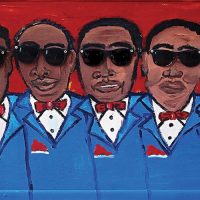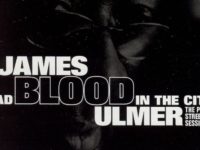by Nick DeRiso
A truly special, even virtuoso, street-level discovery, Snooks Eaglin burst onto the musical landscape with this nearly uncatagorizable debut.
The in-joke around New Orleans was that he was presented as a “folk” musician, when in actuality the then-22-year-old Eaglin had already been playing in electric blues and R&B bands for a decade. In fact, he’d gotten his first guitar at age 6 and had begun playing rudimentary songs (despite being blind) not long thereafter. As a pre-teen, he was performing with legendary Crescent City pianist Eddie Bo, later appeared with a young Allen Toussaint in a dance band called the Flamingos and is said to have played guitar on Sugarboy Crawford’s seminal recording of “Jock-A-Mo.”
But the record-label execs found Eaglin messing around on a French Quarter curb, playing for change, and New Orleans Street Singer launched his career.
Eaglin’s best-selling stuff came on the Imperial imprint, working with Dave Bartholomew, the trumpet-playing brain trust behind Fats Domino’s hits. Toussant — who is, with Bartholomew, one of the city’s most important musical svengalis — once said Eaglin was a “human jukebox.”
Still, New Orleans Street Singer, even if it was not representational, was certainly sensational. For all of the foot-stomping joys of his band recordings, this one remains the surest testament to Eaglin’s pure genius — as a performer and as an arranger.
Eaglin, of course, wasn’t a traditional folk singer — much less a typical street performer, in the strictest sense of the word. He found material in less traditional places, and clearly preferred the sounds he heard pouring out of dance clubs and passing car radioes. They called this record “folk,” but much of the material — not least of which was “St. James Infirmary,” by Hot Lips Page; and “Careless Love,” done by both Kid Ory and Bessie Smith, among others — was actually part of the mainstream black music of the day.
Eaglin had apparently even been referred to, for a time in the mid-1950s, as “Lil Ray Charles.”
Still, there is an immediacy in solo recordings that can’t be matched. Eaglin’s soulful genius is stripped bare, even on songs that feel more like record-label suggestions — like, say, on the tepid “Rock Island Line.” You didn’t necessarily get the sense, on later sessions with a larger band, that Eaglin was such a tremendous talent with the six string.
Is he ever.
And in the most surprising of ways: He crafts, for instance, a Jose Feliciano-vibe on “Looking for a Woman,” the old Jimmy McCracklin tune. Eaglin, over the song’s 2:25 minutes, manages to invent New Orleans flamenco. Next, he settles into a traditional approach to Lightnin’ Hopkins’ “Walking Blues.”
Just that quick, though, he’s back in a groove on the underappreciated Amos Milburn’s rollicking “Let Me Go Home, Whiskey.” Notable, too, is “Trouble In Mind,” one of the few secular hits for Sister Rosetta Tharpe — a key influence for many of rockabilly’s earliest stars.
Eaglin, in a variety of subtle ways, quickly belies the faux-rural aesthetic (included, for instance, is Mercy Dee Walton’s “One Room Country Shack”) that these producers initially tried to pigeon-hole him into.
“High Society,” an early New Orleans piano standard, is the tongue-wagging high point on Street Singer. That Eaglin could accomplish so much, even while converting the tune’s complex structure to guitar, provided a foundation of the well-deserved legend that followed.
Of course, Eaglin’s genius was only fully realized again late in his career — check him out with George Porter, above — during a series of well-attended performances around New Orleans (notably at Mid-City Lanes), but this is where it began.
Nick’s note: The original New Orleans Street Singer was reissued as a deluxe double CD in 2005 by Smithsonian Folkways, and included eight previously unreleased tracks. The best of those is Charles Brown’s “Drifting Blues,” which starts as your typical 12-bar slow burn — then goes, thrillingly, into the jazz phrasing that would define the genre in the 1960s. Champion Jack Dupree’s “Come Back, Baby” is terrific, too.
- Nick DeRiso’s Best of 2015 (Rock + Pop): Death Cab for Cutie, Joe Jackson, Toto + Others - January 18, 2016
- Nick DeRiso’s Best of 2015 (Blues, Jazz + R&B): Boz Scaggs, Gavin Harrison, Alabama Shakes - January 10, 2016
- Nick DeRiso’s Best of 2015 (Reissues + Live): John Oates, Led Zeppelin, Yes, Faces + others - January 7, 2016





I used to go hear and hang out some with Snooks in NOLA down at Rock & Bowl. He was a funny dude and really great player